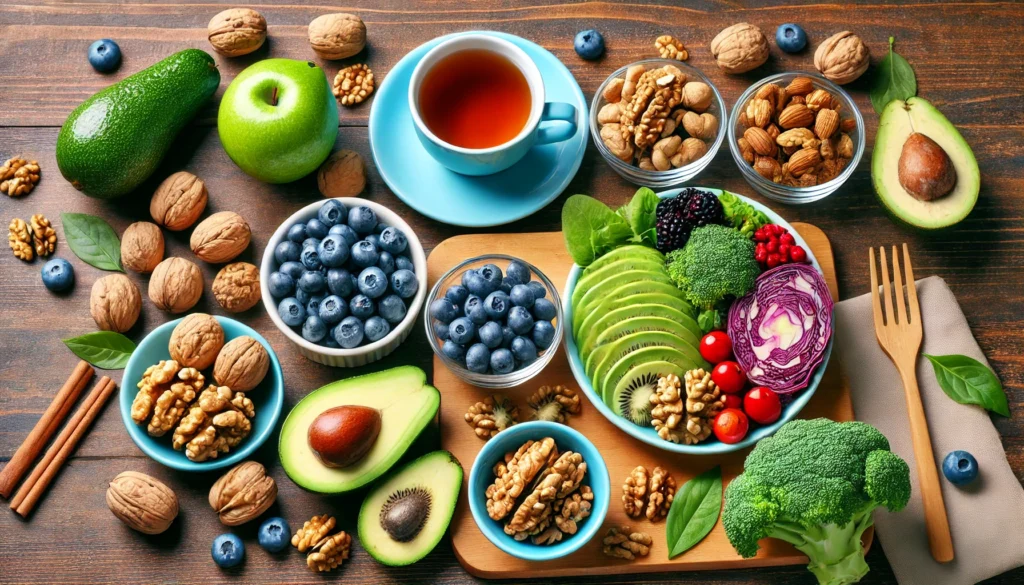In a world that increasingly values mental acuity and cognitive resilience, understanding how to boost brain cell growth naturally is crucial. The human brain, a marvel of biological engineering, comprises billions of neurons that form a complex network enabling everything from basic motor functions to advanced cognitive processes. But how do we keep these neurons healthy and encourage the growth of new ones? In this article, we explore natural methods to enhance brain cell development, offering insights that blend scientific understanding with practical application.
You may also like: Top Herbs to Enhance Your Focus
Understanding Neuron Growth
Before diving into the strategies for enhancing brain cell growth, it’s essential to understand the basics of neurogenesis—the process by which new neurons are formed in the brain. Traditionally, it was believed that humans are born with a fixed number of neurons. However, recent research has debunked this myth, revealing that the adult brain can generate new neurons, especially in the hippocampus, a region associated with learning and memory.
The Science of Neurogenesis
Neurogenesis is influenced by a variety of factors, including genetics, environment, and lifestyle choices. The health of your neurons plays a pivotal role in brain functionality, impacting everything from memory retention to emotional well-being. A healthy human brain thrives on the dynamic balance between neuron creation and the death of old cells, a process crucial for maintaining cognitive health and plasticity.
The process of neurogenesis is predominantly observed in the hippocampus, a critical region for memory and learning. This discovery has significant implications for understanding how we can support brain health throughout life. The hippocampus is sensitive to various external stimuli, which can either enhance or impede the growth of new neurons. Understanding these stimuli can help in crafting lifestyle choices that promote neural health.
Factors Influencing Neurogenesis
Several intrinsic and extrinsic factors influence the rate of neurogenesis. Genetics play a foundational role, determining the basic potential for neuron growth and regeneration. However, lifestyle factors such as diet, exercise, and stress levels can significantly modify this potential. Environmental enrichment, characterized by a stimulating environment with mental and physical challenges, has been shown to promote neurogenesis, underscoring the importance of a holistic approach to brain health.
Neuroplasticity and Brain Health
Neuroplasticity, the brain’s ability to reorganize itself by forming new neural connections throughout life, is closely linked to neurogenesis. This adaptability is crucial for learning new skills, recovering from brain injuries, and adapting to changes in the environment. Enhancing neuroplasticity through lifestyle changes can lead to improved cognitive function and resilience. Strategies that promote neuroplasticity often overlap with those that encourage neurogenesis, offering a comprehensive approach to maintaining brain health.
How to Increase Brain Cells Naturally
Developing strategies to naturally increase brain cells involves lifestyle modifications and adopting habits that promote neural health. Here are several evidence-based practices to consider:
1. Physical Exercise
Physical exercise is one of the most potent stimulants of neurogenesis. Aerobic activities like running, swimming, or cycling increase blood flow to the brain, fostering an environment conducive to the growth of new neurons. Regular physical activity also boosts the production of brain-derived neurotrophic factor (BDNF), a protein that supports neuron survival and growth.
Regular exercise not only stimulates neurogenesis but also enhances overall brain function. Engaging in consistent physical activity can improve mood, reduce anxiety, and boost cognitive performance. The increased blood flow during exercise delivers more oxygen and nutrients to the brain, aiding in the maintenance of existing neurons and the creation of new ones. High-intensity interval training (HIIT) and strength training are also beneficial, offering varied stimuli that further enhance neural growth.
2. Balanced Nutrition
Your diet significantly impacts brain health. Consuming foods rich in omega-3 fatty acids, antioxidants, and vitamins promotes the development of healthy neurons. Omega-3s, found in fish, flaxseeds, and walnuts, are crucial for building brain cells. Antioxidant-rich foods like berries, dark chocolate, and leafy greens combat oxidative stress, protecting neurons from damage.
Nutritional balance goes beyond just omega-3s and antioxidants. Vitamins B6, B12, and folic acid are essential for brain health, aiding in the production of neurotransmitters and the maintenance of brain structures. Whole grains, legumes, and lean proteins provide the necessary building blocks for neurotransmitter synthesis. Hydration also plays a vital role; adequate water intake ensures optimal brain function and helps prevent neuronal damage.
3. Mental Stimulation
Engaging in mentally stimulating activities encourages new neuron growth. Puzzles, reading, learning a new language, or playing musical instruments are excellent ways to challenge your brain. These activities enhance synaptic plasticity, the ability of synapses to strengthen or weaken over time, which is crucial for learning and memory.
Diverse mental activities stimulate different areas of the brain, promoting a holistic approach to cognitive health. Interactive activities like video games and virtual reality experiences can also enhance cognitive function by challenging coordination and spatial awareness. Social learning environments, such as study groups or clubs, combine mental stimulation with social interaction, offering dual benefits for brain health.

4. Mindfulness and Meditation
Mindfulness and meditation practices have been linked to increased neurogenesis. These practices promote relaxation and reduce stress, which is known to inhibit neuron growth. Regular meditation can enhance attention span, improve emotional regulation, and promote overall mental well-being. Mindfulness practices encourage a state of focused awareness, which can lead to structural changes in the brain, supporting neural growth and resilience.
5. Environmental Enrichment
Creating a stimulating environment is crucial for promoting neurogenesis. Exposure to new experiences, places, and challenges can enhance brain plasticity. Travel, engaging in art or dance, or taking up new hobbies can provide the necessary stimuli for brain growth. An enriched environment encourages curiosity and exploration, which are fundamental for cognitive development and maintaining a healthy brain.
How to Regain Brain Cells
Regaining brain cells lost to age or injury involves creating an environment that supports neurogenesis and minimizes neurodegeneration.
1. Quality Sleep
Sleep is vital for brain health. During sleep, the brain undergoes a restorative process, clearing out toxins that accumulate during the day. Sleep deprivation impairs neuron function and can lead to cognitive decline. Prioritize regular sleep patterns to support brain cell regeneration.
The different stages of sleep play distinct roles in maintaining brain health. Deep sleep is particularly important for neurogenesis, as it facilitates the consolidation of new memories and the pruning of unnecessary synapses. Establishing a sleep routine that includes seven to nine hours of quality sleep is essential for optimal brain function. Limiting screen time before bed and creating a calming bedtime routine can help improve sleep quality.
2. Stress Management
Chronic stress is detrimental to brain health, negatively affecting neurogenesis. Practicing stress-reduction techniques such as mindfulness, meditation, and yoga can lower cortisol levels, thereby promoting a healthier environment for brain cell growth.
Stress management involves more than just practicing relaxation techniques. It’s about identifying stressors and developing coping strategies to handle them effectively. Engaging in regular physical activity, maintaining social connections, and ensuring adequate rest are all part of a comprehensive stress management plan. Journaling and creative outlets like art and music can also serve as effective stress-relief practices.
3. Social Connections
Maintaining strong social bonds is linked to improved brain health. Social interactions stimulate cognitive processes and have been associated with increased neurogenesis. Engaging with a community or participating in group activities can foster brain health and resilience.
Social connections provide emotional support, which can buffer against stress and promote a sense of belonging. Regular social interactions, whether through family, friends, or community groups, contribute to cognitive health by encouraging communication, empathy, and problem-solving skills. Participating in group activities like book clubs, sports teams, or volunteer work can further stimulate brain function and enhance overall well-being.
4. Cognitive Rehabilitation
For those who have experienced brain injuries, cognitive rehabilitation offers structured techniques to regain lost function. This approach involves exercises and therapies designed to improve memory, attention, and executive functions. Working with a cognitive therapist can tailor a rehabilitation program that addresses specific needs and supports neurogenesis.
5. Nutritional Support for Recovery
In cases of brain injury or age-related decline, specific dietary interventions can support recovery. Nutrients such as choline, found in eggs and liver, and zinc, present in nuts and seeds, are crucial for brain repair and regeneration. Supplements like curcumin and resveratrol have shown promise in promoting brain health and aiding recovery.

The Future of Brain Health
The exploration of how to develop brain cells naturally is not only an endeavor grounded in current scientific understanding but also one that has exciting future implications. Advances in neuroscience and biohacking continue to reveal new strategies and technologies that could further enhance our cognitive capabilities.
Emerging Trends and Future Directions
Research into nootropics and neuroplasticity suggests that we may soon have even more tools at our disposal for boosting brain health. Nootropics—substances that enhance cognitive function—are gaining popularity among biohackers seeking to optimize brain performance. While some, like caffeine and certain B vitamins, are well-known, others are under investigation for their potential benefits.
As our understanding of neurogenesis and brain health deepens, personalized medicine approaches are likely to emerge. Tailored interventions based on genetic makeup and lifestyle may offer more effective ways to enhance cognitive function. Technology such as brain-computer interfaces and neurofeedback devices are being explored for their potential to directly influence brain activity and promote neurogenesis.
The Role of Technology in Brain Health
Technological advancements are opening new avenues for enhancing brain health. Virtual reality and artificial intelligence are being integrated into cognitive training programs, offering immersive and adaptive learning experiences. These technologies have the potential to revolutionize how we approach brain training, making it more accessible and effective.
Ethical Considerations
As we venture into new territories of brain enhancement, ethical considerations must be addressed. The use of cognitive enhancers raises questions about fairness, accessibility, and the potential for misuse. Establishing guidelines and regulations will be crucial to ensure that advancements in brain health are used responsibly and equitably.

Conclusion
Boosting brain cell growth naturally is a multifaceted approach involving physical, dietary, and mental health strategies. By incorporating exercise, a balanced diet, mental stimulation, and stress management into your daily routine, you can foster a healthy brain capable of growth and regeneration. As scientific research progresses, we will continue to uncover new ways to support and enhance our cognitive health. Whether you’re a health coach, journalist, or biohacker, understanding and applying these natural methods can lead to profound benefits in neural health and overall well-being.
In the quest for a healthier, more resilient brain, the journey of understanding how to gain brain cells and enhance neural health is both an exciting and rewarding path. Embrace these natural strategies and look forward to a future where cognitive vitality is within reach for all. By staying informed and proactive, you can contribute to your own cognitive longevity and enjoy the benefits of a sharp and agile mind throughout your life.
Further Reading:
11 Ways To Grow New Brain Cells And Stimulate Neurogenesis
How can I regenerate my brain cells naturally?
Brain Cell Regeneration: Natural Methods to Restore and Regrow Neurons
Important Note: The information contained in this article is for general informational purposes only, and should not be construed as health or medical advice, nor is it intended to diagnose, prevent, treat, or cure any disease or health condition. Before embarking on any diet, fitness regimen, or program of nutritional supplementation, it is advisable to consult your healthcare professional in order to determine its safety and probable efficacy in terms of your individual state of health.
Regarding Nutritional Supplements Or Other Non-Prescription Health Products: If any nutritional supplements or other non-prescription health products are mentioned in the foregoing article, any claims or statements made about them have not been evaluated by the U.S. Food and Drug Administration, and such nutritional supplements or other health products are not intended to diagnose, treat, cure, or prevent any disease.


